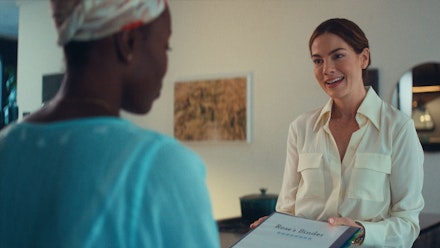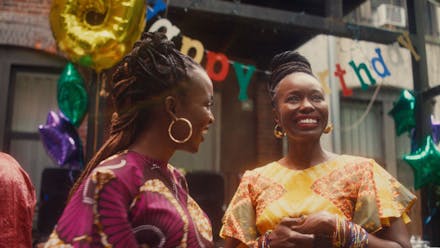Nikyatu Jusu’s directorial feature starts as it means to go on: Rina Yang’s beautiful cinematography finds Anna Diop’s Aisha lying in a paralysed state as a spider crawls onto her face. In truth, it’s one of Nanny's many symbols, enriched by African folktales of Anansi the Spider, and the water spirit Mami Wata. But Jusu’s take on the American Dream is equally nightmarish.
The ‘land of opportunity', as viewed by an immigrant, is not seen as hopeful. For Aisha, it’s a gateway for exploitation, manipulation and gaslighting microaggressions from her new employers, Amy (Michelle Monaghan) and Adam (Morgan Spector). The couple’s awkwardness and busy lifestyles only amplify the conversations about how Black female characters (and their lived experience) are seen as dismissable or unimportant through white perspectives.

Cleverly, it feeds into Jusu’s larger explorations on motherhood, separation anxiety and the isolating loneliness of being in a foreign land away from your community. Aisha's bonding with the couple's young daughter Rose (Rose Decker), taking care of the child’s wellbeing including feeding her jollof rice — salvation from Amy’s bland food prep for her daughter — feel superficial in comparison to her longing for her son Lamine (Jahleel Kamara), a connection reduced to long-distance video calls. They say nothing compares to a mother’s bond for their child, and the fear of losing that bond becomes a haunting presence for Aisha when she begins to see unsettling visions.
Jusu’s film remains incredibly restrained by avoiding the classic horror cliches.
That's why Nanny represents a refreshing direction for horror fans. What could have easily veered into Get Out territory (a film often imitated but never duplicated), Jusu’s film remains incredibly restrained by avoiding the classic horror cliches. Jusu’s script is not interested in Amy and Adam and solving the mystery of their crumbling, elusive relationship or the couple's neglect of their daughter Rose. Instead, Nanny is presented as a sharply focused gaze on Aisha, allowing the character to celebrate the richness of her life where Black joy and Black love are treated with valuable measure. The horror elements — never finding itself in positions of cheap thrills or scares — are bonuses.
Admittedly, its occasionally muddled plot and rushed ending threaten to undo some of Jusu’s profound work, but the sure-footedness comes from its leading star. Diop is captivating, embodying the multifaceted nuances of Black womanhood. Her attempts to maintain her cultural and spiritual connection to her home and her son demonstrate the film’s poetic subtlety to explore the otherworldly without sacrificing thematic quality.
